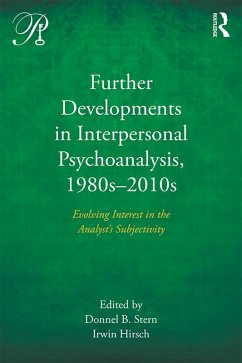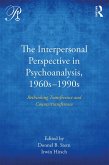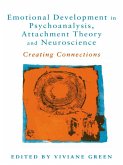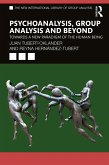Further Developments in Interpersonal Psychoanalysis, 1980s-2010s (eBook, PDF)
Evolving Interest in the Analyst's Subjectivity
Redaktion: Stern, Donnel B.; Hirsch, Irwin
42,95 €
42,95 €
inkl. MwSt.
Sofort per Download lieferbar

21 °P sammeln
42,95 €
Als Download kaufen

42,95 €
inkl. MwSt.
Sofort per Download lieferbar

21 °P sammeln
Jetzt verschenken
Alle Infos zum eBook verschenken
42,95 €
inkl. MwSt.
Sofort per Download lieferbar
Alle Infos zum eBook verschenken

21 °P sammeln
Further Developments in Interpersonal Psychoanalysis, 1980s-2010s (eBook, PDF)
Evolving Interest in the Analyst's Subjectivity
Redaktion: Stern, Donnel B.; Hirsch, Irwin
- Format: PDF
- Merkliste
- Auf die Merkliste
- Bewerten Bewerten
- Teilen
- Produkt teilen
- Produkterinnerung
- Produkterinnerung

Bitte loggen Sie sich zunächst in Ihr Kundenkonto ein oder registrieren Sie sich bei
bücher.de, um das eBook-Abo tolino select nutzen zu können.
Hier können Sie sich einloggen
Hier können Sie sich einloggen
Sie sind bereits eingeloggt. Klicken Sie auf 2. tolino select Abo, um fortzufahren.

Bitte loggen Sie sich zunächst in Ihr Kundenkonto ein oder registrieren Sie sich bei bücher.de, um das eBook-Abo tolino select nutzen zu können.
Further Developments in Interpersonal Psychoanalysis, 1980s-2010s is the second collection of selected classic articles of the modern era by psychoanalysts identified with the interpersonal perspective. This book contains those written by the third and fourth generation of interpersonal psychoanalysts.
- Geräte: PC
- mit Kopierschutz
- eBook Hilfe
- Größe: 19.97MB
Andere Kunden interessierten sich auch für
![Further Developments in Interpersonal Psychoanalysis, 1980s-2010s (eBook, ePUB) Further Developments in Interpersonal Psychoanalysis, 1980s-2010s (eBook, ePUB)]() Further Developments in Interpersonal Psychoanalysis, 1980s-2010s (eBook, ePUB)42,95 €
Further Developments in Interpersonal Psychoanalysis, 1980s-2010s (eBook, ePUB)42,95 €![The Interpersonal Perspective in Psychoanalysis, 1960s-1990s (eBook, PDF) The Interpersonal Perspective in Psychoanalysis, 1960s-1990s (eBook, PDF)]() The Interpersonal Perspective in Psychoanalysis, 1960s-1990s (eBook, PDF)49,95 €
The Interpersonal Perspective in Psychoanalysis, 1960s-1990s (eBook, PDF)49,95 €![Psychoanalysis, Apathy, and the Postmodern Patient (eBook, PDF) Psychoanalysis, Apathy, and the Postmodern Patient (eBook, PDF)]() Laurence KahnPsychoanalysis, Apathy, and the Postmodern Patient (eBook, PDF)39,95 €
Laurence KahnPsychoanalysis, Apathy, and the Postmodern Patient (eBook, PDF)39,95 €![Developments in Field Theory for Psychotherapists, Psychoanalysts and Counsellors (eBook, PDF) Developments in Field Theory for Psychotherapists, Psychoanalysts and Counsellors (eBook, PDF)]() Developments in Field Theory for Psychotherapists, Psychoanalysts and Counsellors (eBook, PDF)51,95 €
Developments in Field Theory for Psychotherapists, Psychoanalysts and Counsellors (eBook, PDF)51,95 €![Emotional Development in Psychoanalysis, Attachment Theory and Neuroscience (eBook, PDF) Emotional Development in Psychoanalysis, Attachment Theory and Neuroscience (eBook, PDF)]() Emotional Development in Psychoanalysis, Attachment Theory and Neuroscience (eBook, PDF)35,95 €
Emotional Development in Psychoanalysis, Attachment Theory and Neuroscience (eBook, PDF)35,95 €![Art, Psychoanalysis, and Adrian Stokes (eBook, PDF) Art, Psychoanalysis, and Adrian Stokes (eBook, PDF)]() Janet SayersArt, Psychoanalysis, and Adrian Stokes (eBook, PDF)50,95 €
Janet SayersArt, Psychoanalysis, and Adrian Stokes (eBook, PDF)50,95 €![Psychoanalysis, Group Analysis, and Beyond (eBook, PDF) Psychoanalysis, Group Analysis, and Beyond (eBook, PDF)]() Juan Tubert-OklanderPsychoanalysis, Group Analysis, and Beyond (eBook, PDF)33,95 €
Juan Tubert-OklanderPsychoanalysis, Group Analysis, and Beyond (eBook, PDF)33,95 €-
-
-
Further Developments in Interpersonal Psychoanalysis, 1980s-2010s is the second collection of selected classic articles of the modern era by psychoanalysts identified with the interpersonal perspective. This book contains those written by the third and fourth generation of interpersonal psychoanalysts.
Dieser Download kann aus rechtlichen Gründen nur mit Rechnungsadresse in A, B, BG, CY, CZ, D, DK, EW, E, FIN, F, GR, HR, H, IRL, I, LT, L, LR, M, NL, PL, P, R, S, SLO, SK ausgeliefert werden.
Produktdetails
- Produktdetails
- Verlag: Taylor & Francis eBooks
- Seitenzahl: 350
- Erscheinungstermin: 14. Dezember 2017
- Englisch
- ISBN-13: 9781351265393
- Artikelnr.: 50520189
- Verlag: Taylor & Francis eBooks
- Seitenzahl: 350
- Erscheinungstermin: 14. Dezember 2017
- Englisch
- ISBN-13: 9781351265393
- Artikelnr.: 50520189
- Herstellerkennzeichnung Die Herstellerinformationen sind derzeit nicht verfügbar.
Donnel B. Stern is Training and Supervising Analyst at the William Alanson White Institute in New York City and Adjunct Clinical Professor of Psychology on the New York University Postdoctoral Program in Psychotherapy and Psychoanalysis. He is the founder and editor of the Routledge "Psychoanalysis in a New Key" book series and author of many psychoanalytic articles and books, the most recent of which is Relational Freedom: Emergent Properties of the Interpersonal Field. Irwin Hirsch supervises and/or teaches at the Manhattan Institute for Psychoanalysis; the William Alanson White Institute; the NYU Postdoctoral Program in Psychotherapy and Psychoanalysis and the National Institute for the Psychotherapies, National Program. He has authored over 80 journal articles and book chapters and two books: Coasting in the Countertransference: Conflicts of Self-Interest between Analyst and Patient, winner of the Goethe Award; and The Interpersonal Tradition: The Origins of Psychoanalytic Subjectivity.
Introduction: Distinguishing features of the interpersonal perspective in
psychoanalysis by Irwin Hirsch.
Prologue to Chapter 1.
1. Roberta Held-Weiss (1985). In praise of actuality.
Prologue to Chapter 2.
2. Jay R. Greenberg (1986). Theoretical models and the analyst's
neutrality.
Prologue to Chapter 3.
3. Stephen A. Mitchell (1991). Contemporary perspectives on self: Toward an
integration.
Prologue to Chapter 4.
4. Edgar A. Levenson (1993). Shoot the messenger-Interpersonal aspects of
the
analyst's interpretations.
Prologue to Chapter 5.
5. Irwin Hirsch (1996). Observing-participation, mutual enactment, and the
new
classical models.
Prologue to Chapter 6.
6. Sandra Buechler (1999). Searching for a passionate neutrality.
Prologue to Chapter 7.
7. Kathleen Pogue White (2002). Surviving hating and being hated.
Prologue to Chapter 8.
8. Mark J. Blechner (2005). The Gay Harry Stack Sullivan.
Prologue to Chapter 9.
9. John Fiscalini (2006). Coparticipant inquiry: Analysis as personal
encounter.
Prologue to Chapter 10.
10. Christopher Bonovitz (2009). Looking back, looking forward: A
reexamination
of Benjamin Wolstein's interlock and the emergence of intersubjectivity.
Prologue to Chapter 11.
11. Emily A. Kuriloff (2010). The Holocaust and psychoanalytic theory and
praxis.
Prologue to Chapter 12.
12. Philip M. Bromberg (2012). Stumbling along and hanging in: If this be
technique, make the most of it.
Prologue to Chapter 13.
13. Donnel B. Stern (2012). Witnessing across time: Accessing the present
from the
past and the past from the present.
psychoanalysis by Irwin Hirsch.
Prologue to Chapter 1.
1. Roberta Held-Weiss (1985). In praise of actuality.
Prologue to Chapter 2.
2. Jay R. Greenberg (1986). Theoretical models and the analyst's
neutrality.
Prologue to Chapter 3.
3. Stephen A. Mitchell (1991). Contemporary perspectives on self: Toward an
integration.
Prologue to Chapter 4.
4. Edgar A. Levenson (1993). Shoot the messenger-Interpersonal aspects of
the
analyst's interpretations.
Prologue to Chapter 5.
5. Irwin Hirsch (1996). Observing-participation, mutual enactment, and the
new
classical models.
Prologue to Chapter 6.
6. Sandra Buechler (1999). Searching for a passionate neutrality.
Prologue to Chapter 7.
7. Kathleen Pogue White (2002). Surviving hating and being hated.
Prologue to Chapter 8.
8. Mark J. Blechner (2005). The Gay Harry Stack Sullivan.
Prologue to Chapter 9.
9. John Fiscalini (2006). Coparticipant inquiry: Analysis as personal
encounter.
Prologue to Chapter 10.
10. Christopher Bonovitz (2009). Looking back, looking forward: A
reexamination
of Benjamin Wolstein's interlock and the emergence of intersubjectivity.
Prologue to Chapter 11.
11. Emily A. Kuriloff (2010). The Holocaust and psychoanalytic theory and
praxis.
Prologue to Chapter 12.
12. Philip M. Bromberg (2012). Stumbling along and hanging in: If this be
technique, make the most of it.
Prologue to Chapter 13.
13. Donnel B. Stern (2012). Witnessing across time: Accessing the present
from the
past and the past from the present.
Introduction: Distinguishing features of the interpersonal perspective in
psychoanalysis by Irwin Hirsch.
Prologue to Chapter 1.
1. Roberta Held-Weiss (1985). In praise of actuality.
Prologue to Chapter 2.
2. Jay R. Greenberg (1986). Theoretical models and the analyst's
neutrality.
Prologue to Chapter 3.
3. Stephen A. Mitchell (1991). Contemporary perspectives on self: Toward an
integration.
Prologue to Chapter 4.
4. Edgar A. Levenson (1993). Shoot the messenger-Interpersonal aspects of
the
analyst's interpretations.
Prologue to Chapter 5.
5. Irwin Hirsch (1996). Observing-participation, mutual enactment, and the
new
classical models.
Prologue to Chapter 6.
6. Sandra Buechler (1999). Searching for a passionate neutrality.
Prologue to Chapter 7.
7. Kathleen Pogue White (2002). Surviving hating and being hated.
Prologue to Chapter 8.
8. Mark J. Blechner (2005). The Gay Harry Stack Sullivan.
Prologue to Chapter 9.
9. John Fiscalini (2006). Coparticipant inquiry: Analysis as personal
encounter.
Prologue to Chapter 10.
10. Christopher Bonovitz (2009). Looking back, looking forward: A
reexamination
of Benjamin Wolstein's interlock and the emergence of intersubjectivity.
Prologue to Chapter 11.
11. Emily A. Kuriloff (2010). The Holocaust and psychoanalytic theory and
praxis.
Prologue to Chapter 12.
12. Philip M. Bromberg (2012). Stumbling along and hanging in: If this be
technique, make the most of it.
Prologue to Chapter 13.
13. Donnel B. Stern (2012). Witnessing across time: Accessing the present
from the
past and the past from the present.
psychoanalysis by Irwin Hirsch.
Prologue to Chapter 1.
1. Roberta Held-Weiss (1985). In praise of actuality.
Prologue to Chapter 2.
2. Jay R. Greenberg (1986). Theoretical models and the analyst's
neutrality.
Prologue to Chapter 3.
3. Stephen A. Mitchell (1991). Contemporary perspectives on self: Toward an
integration.
Prologue to Chapter 4.
4. Edgar A. Levenson (1993). Shoot the messenger-Interpersonal aspects of
the
analyst's interpretations.
Prologue to Chapter 5.
5. Irwin Hirsch (1996). Observing-participation, mutual enactment, and the
new
classical models.
Prologue to Chapter 6.
6. Sandra Buechler (1999). Searching for a passionate neutrality.
Prologue to Chapter 7.
7. Kathleen Pogue White (2002). Surviving hating and being hated.
Prologue to Chapter 8.
8. Mark J. Blechner (2005). The Gay Harry Stack Sullivan.
Prologue to Chapter 9.
9. John Fiscalini (2006). Coparticipant inquiry: Analysis as personal
encounter.
Prologue to Chapter 10.
10. Christopher Bonovitz (2009). Looking back, looking forward: A
reexamination
of Benjamin Wolstein's interlock and the emergence of intersubjectivity.
Prologue to Chapter 11.
11. Emily A. Kuriloff (2010). The Holocaust and psychoanalytic theory and
praxis.
Prologue to Chapter 12.
12. Philip M. Bromberg (2012). Stumbling along and hanging in: If this be
technique, make the most of it.
Prologue to Chapter 13.
13. Donnel B. Stern (2012). Witnessing across time: Accessing the present
from the
past and the past from the present.







